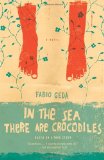Summary | Excerpt | Reading Guide | Reviews | Beyond the Book | Readalikes | Genres & Themes | Author Bio

Based on the True Story of Enaiatollah Akbari
by Fabio GedaI met Enaiatollah Akbari at a book presentation where I was speaking about my first novel, the story of a Romanian boy's life as an immigrant in Italy. Enaiatollah came up to me and said he'd had a similar experience. We got talking. And we didn't stop. I never tired of listening to his experiences, and he didn't tire of dredging them from his memory. After we'd known each other for a while, he asked me if I would write his story down, so that people who had suffered similar things could know they were not alone, and so that others might understand them better.
This book is therefore based on a true story. But, of course, Enaiatollah didn't remember it all perfectly. Together we painstakingly reconstructed his journey, looking at maps, consulting Google, trying to create a chronology for his fragmented memories. I have tried to be as true to his voice as possible, retelling the story exactly as he told it. But for all that, this book must be considered fiction, since it is the recreation of Enaiatollah's experience - a recreation that has allowed him to take possession of his own story.
Fabio Geda, Turin 2010
Afghanistan
The thing is, I really wasn't expecting her to go. Because when you're ten years old and getting ready for bed, on a night that's just like any other night, no darker or starrier or more silent or more full of smells than usual, with the familiar sound of the muezzins calling the faithful to prayer from the tops of the minarets just like anywhere else... no, when you're ten years old - I say ten, although I'm not entirely sure when I was born, because there's no registry office or anything like that in Ghazni province - like I said, when you're ten years old, and your mother, before putting you to bed, takes your head and holds it against her breast for a long time, longer than usual, and says, There are three things you must never do in life, Enaiat jan, for any reason... The first is use drugs. Some of them taste good and smell good and they whisper in your ear that they'll make you feel better than you could ever feel without them. Don't believe them. Promise me you won't do it.
I promise.
The second is use weapons. Even if someone hurts your feelings or damages your memories, or insults God, the earth or men, promise me you'll never pick up a gun, or a knife, or a stone, or even the wooden ladle we use for making qhorma palaw, if that ladle can be used to hurt someone. Promise.
I promise.
The third is cheat or steal. What's yours belongs to you, what isn't doesn't. You can earn the money you need by working, even if the work is hard. You must never cheat anyone, Enaiat jan, all right? You must be hospitable and tolerant to everyone. Promise me you'll do that.
I promise.
Anyway, even when your mother says things like that and then, still stroking your neck, looks up at the window and starts talking about dreams, dreams like the moon, which at night is so bright you can see to eat by it, and about wishes - how you must always have a wish in front of your eyes, like a donkey with a carrot, and how it's in trying to satisfy our wishes that we find the strength to pick ourselves up, and if you hold a wish up high, any wish, just in front of your forehead, then life will always be worth living - well, even when your mother, as she helps you get to sleep, says all these things in a strange, low voice as warming as embers, and fills the silence with words, this woman who's always been so sharp, so quick-witted in dealing with life?... even at a time like that, it doesn't occur to you that what she's really saying is, Khoda negahdar, goodbye.
Just like that.
When I opened my eyes in the morning, I had a good stretch to wake myself up, then reached over to my right, feeling for the comforting presence of my mother's body. The reassuring smell of her skin always said to me, Wake up, get out of bed, come on... But my hand felt nothing, only the white cotton cover between my fingers. I pulled it toward me. I turned over, with my eyes wide open. I propped myself on my elbows and tried calling out, Mother. But she didn't reply and no one replied in her place. She wasn't on the mattress, she wasn't in the room where we had slept, which was still warm with bodies tossing and turning in the half-light, she wasn't in the doorway, she wasn't at the window looking out at the street filled with cars and carts and bikes, she wasn't next to the water jars or in the smokers' corner talking to someone, as she had often been during those three days.
Excerpted from In the Sea There are Crocodiles by Fabio Geda. Copyright © 2011 by Fabio Geda. Excerpted by permission of Doubleday, a division of Random House, Inc. All rights reserved. No part of this excerpt may be reproduced or reprinted without permission in writing from the publisher.
What really knocks me out is a book that, when you're all done reading, you wish the author that wrote it was a ...
Click Here to find out who said this, as well as discovering other famous literary quotes!
Your guide toexceptional books
BookBrowse seeks out and recommends the best in contemporary fiction and nonfiction—books that not only engage and entertain but also deepen our understanding of ourselves and the world around us.